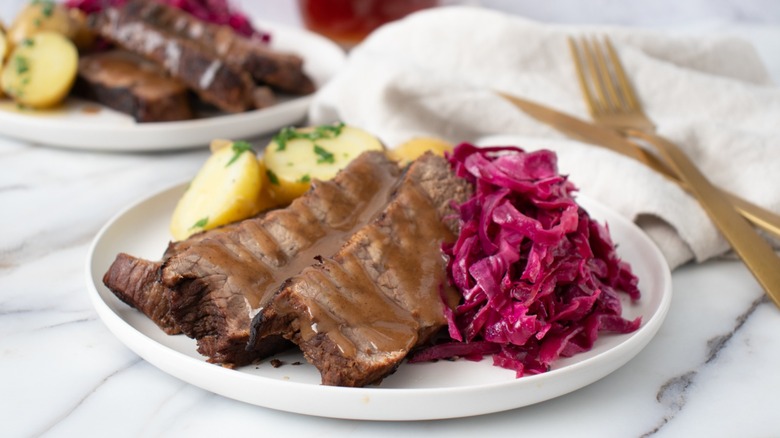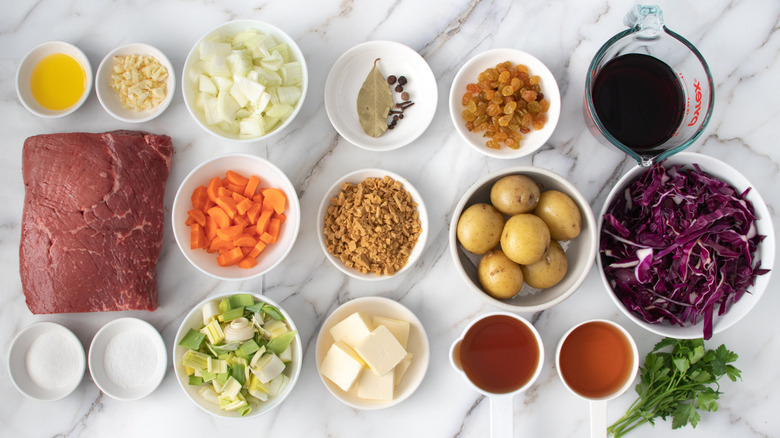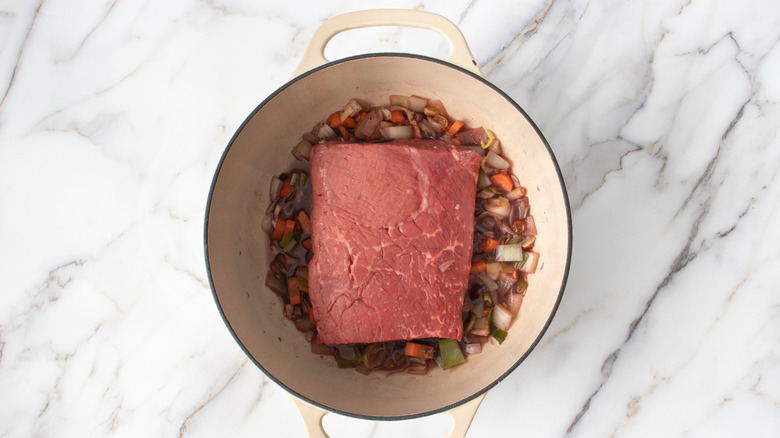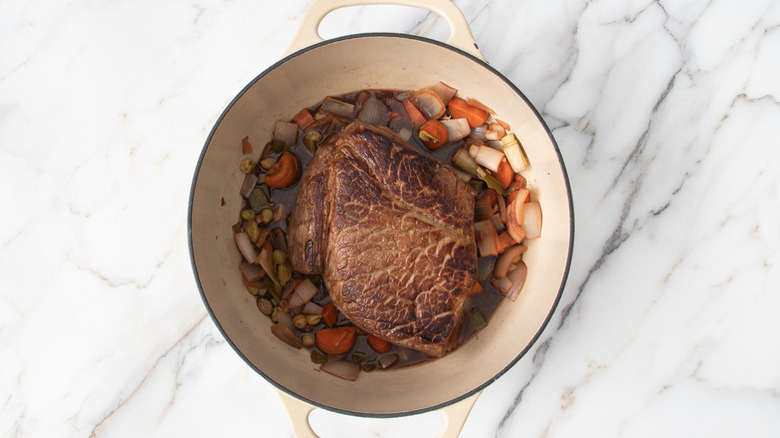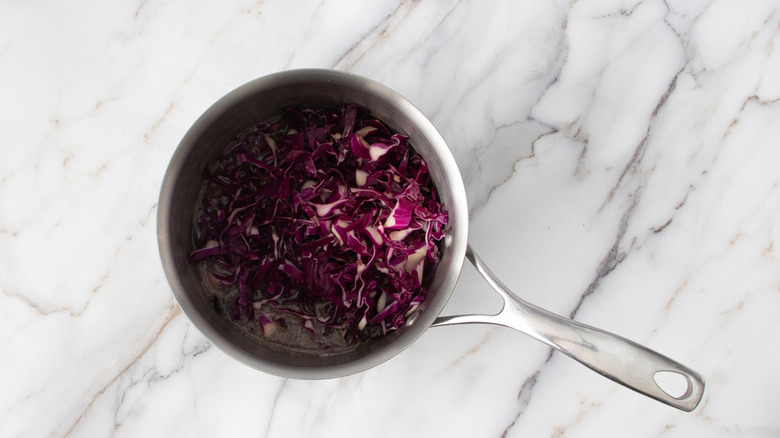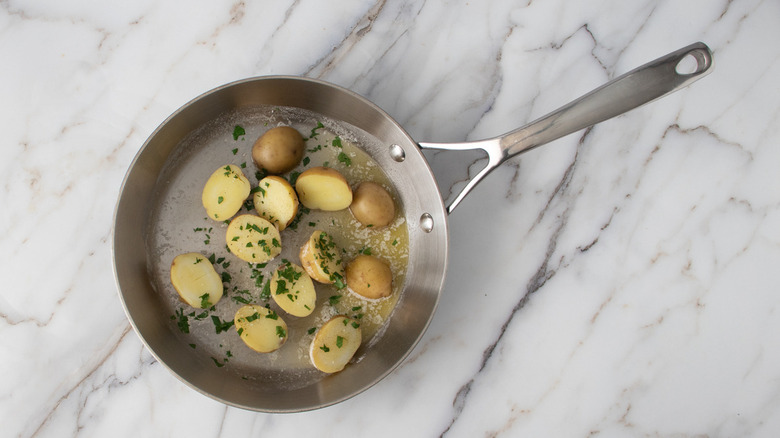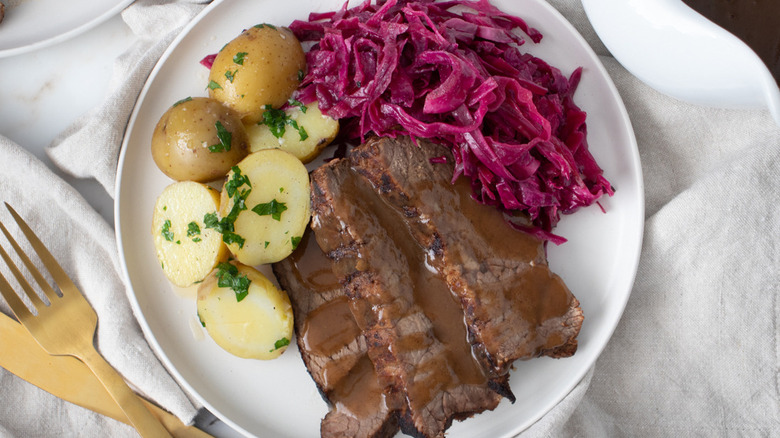Classic German Sauberbraten Recipe
Sauerbraten is a German word that Google Translate tells us means "sour roast meat," something that's usually an accurate description of the dish. This particular recipe is less sour than some, though, as it uses red wine instead of vinegar and not all types of red wine are all that acidic. This recipe also has some sweetness from the sugar and raisins in the marinade as well as the crushed gingersnaps in the sauce. While recipe developer Patterson Watkins speaks of these cookies as an "unusual ingredient," they're actually quite typical for sauerbraten. Watkins explains that the crumbs "act as a cool roux in this recipe, thickening and flavoring the sauerbraten sauce."
If you're thinking of trying this sauerbraten recipe, you'll need to block out a good chunk of time in which to do so. Watkins notes that "sauerbraten has a looooooong marination time" and compares the process to making corned beef from scratch. The two to five days you'll need to marinate the meat are inactive, though, so you'll actually only need to put in a few hours of hands-on time in order to prepare the meat, the sauce, and the sauteed red cabbage and boiled potatoes that accompany this dish.
Assemble the ingredients for the classic German sauerbraten
Not only does this sauerbraten require several days to make, but it requires quite a lengthy list of ingredients, as well. The main component is a beef roast which is marinated in a mixture of onions, carrots, leeks, garlic, raisins, salt, sugar, beef broth, red wine, a bay leaf, juniper berries, cloves, and peppercorns and then browned in oil.
For the cooked cabbage, you'll need cabbage, of course (the red kind), as well as butter, apple juice, and ground pepper. You'll also be boiling up some potatoes and sprinkling them with parsley. The very last thing you'll need for this meal, making a grand total of 22 ingredients, is a few gingersnap cookies to thicken the sauce.
Marinate the meat
The whole process starts off by making a marinade. Combine the onion, carrot, leek, garlic, raisins, salt, sugar, broth, 1 cup wine, bay leaf, juniper berries, cloves, and peppercorns in a large pot. Watkins insists that the pot must be a "non-reactive" one, but goes on to explain that cast-iron, stainless steel, or enamel surfaces will all work just fine. She does advise against using a non-coated tin, copper, or aluminum pot, though, as she says the reaction between these metals and any acid in the wine could "result in some funky, metallic tasting sauerbraten." Turn the heat to medium and bring the marinade to a simmer, then turn the heat down to low and let it cook for about 10 minutes until the vegetables soften up a bit.
Turn off the heat and let the marinade cool down to room temperature, then stick the roast in there and cover it up with the liquid as best you can. Cover the pot and put the whole thing in the refrigerator. The meat needs to marinate for anywhere from two to five days, but you should turn it over every day. This, Watkins tells us, will "ensure even marination."
Cook the meat
Fast-forward several days until the meat is done marinating. Take it out of the marinade, but don't throw away the liquid since you're still going to be using it. Pat the roast dry with paper towels, then heat the oil in a large pan over a burner set to high. Cook the meat for about 3 minutes on each side to brown it.
Put the marinade pot back on the stove and bring the liquid to a simmer over medium heat. Add the meat to the pot and turn the heat down to low. Cook the meat for about two hours, turning it over after one hour. When the meat is done, it will be, as Watkins describes it, "just about fork-tender, not falling apart like pulled brisket or pork, but easily sliced."
Cook the cabbage
About half an hour or so before the sauerbraten is done, you can get started on the vegetables. First, melt half the butter (3 tablespoons) in a pan and stir in the cabbage along with the rest of the wine and the apple juice. Let the cabbage come to a simmer, then turn the heat down to low and cover the pot. Keep cooking it for 20 to 30 minutes until it softens up, then season it with salt and pepper. Keep it warm until the meat and potatoes are done.
Boil the potatoes
As the cabbage cooks, you can also boil the potatoes. Fill a large pot about ¾ of the way up with water, then boil the water and add the potatoes. Cook them for about 20 to 25 minutes until you can stick a fork in them, then drain off the water. Melt the rest of the butter in a pan, then stir in the potatoes, making sure they're coated. Garnish them with parsley and season them with salt and pepper, then do your best to keep them warm, as well.
Prepare the sauce
We've reached the last step, at last! Remove the meat from the marinade, then strain the vegetables out of the liquid. Watkins does say "you can discard the veggies," but if you'd prefer not to waste them, you can always puree them and use them to thicken a soup or stew.
Pour the strained liquid back into the pot and bring it to a simmer over medium heat one more time. Stir the crumbled cookies into the liquid, simmering until they break down entirely and the sauce thickens to the consistency of gravy. At this point, your entire dinner is done, so you can serve up the sauerbraten with cabbage and potatoes on the side and pour some of the sauce over the top.
Classic German Sauberbraten Recipe
If you enjoy classic German cooking, then this sauerbraten is just the labor of love that you're looking for.
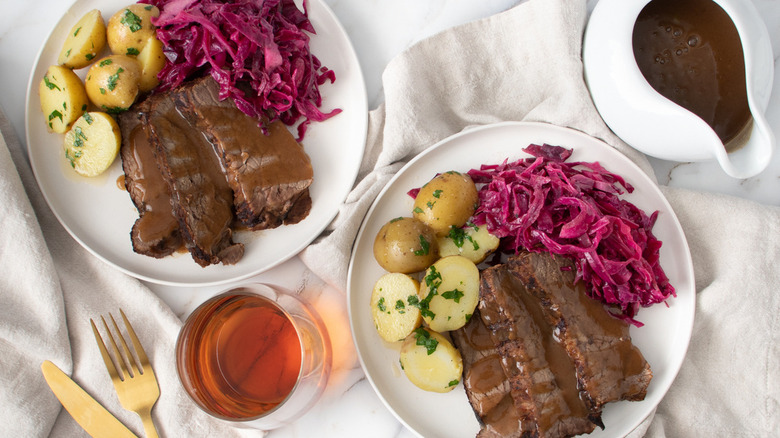
Ingredients
- 1 large onion, peeled and diced
- 1 large carrot, peeled and diced
- ½ leek, diced
- 2 cloves garlic, minced
- ¼ cup golden raisins
- 1 ¼ teaspoons salt
- 2 teaspoons granulated sugar
- ½ cup beef broth
- 1 ½ cup red wine, divided
- 1 bay leaf
- 4 juniper berries
- 3 whole cloves
- 5 peppercorns
- 1 (3-pound) beef chuck roast
- 1 tablespoon olive oil or vegetable oil
- 6 tablespoons butter, divided
- 3 cups shredded red cabbage
- ½ cup apple juice
- Ground black pepper, to taste
- 1 pound baby or new potatoes, halved
- 1 tablespoon chopped parsley
- 5 gingersnap cookies, crushed (about ½ cup)
Directions
- Combine the onion, carrot, leek, garlic, raisins, salt, sugar, broth, 1 cup of wine, bay leaf, juniper berries, cloves, and peppercorns in a large pot, stirring to combine.
- Bring the marinade to a simmer over medium heat, stirring occasionally, and cook for 10 minutes or until the vegetables are moderately tender.
- Cool the marinade to room temperature.
- Soak the roast in the marinade, then cover it and refrigerate for at least 2 days or a maximum of 5 days, turning it daily.
- Remove the roast from the marinade, reserving the latter. Pat the roast dry with paper towels.
- Heat the oil in a large pan over high heat.
- Sear the roast for about 3 minutes per side until browned.
- Bring the marinade to a simmer over medium heat.
- Put the roast in the pot with the marinade and reduce the heat to low.
- Cover the pot and cook the roast for 2 hours, flipping it after an hour.
- 30 to 40 minutes before the roast is done cooking, melt 3 tablespoons of butter over medium heat.
- Stir the cabbage, remaining wine, and apple juice into the butter and bring the mixture to a simmer. Reduce the heat to low, cover, and continue cooking the cabbage for 20 to 30 minutes until tender. Season the cabbage with salt and pepper and keep it warm.
- Fill a large pot ¾ full with water and bring it to a boil over high heat.
- Cook the potatoes in the boiling water for 20 to 25 minutes or until tender, then drain them.
- Melt the remaining butter in a pan over medium heat, then add the potatoes, stirring to coat them.
- Sprinkle the potatoes with parsley, season them with salt and pepper, and keep them warm.
- Take the cooked roast out of the pot and let it rest.
- Strain the marinade, reserving the liquid.
- Return the liquid to the pot and bring it to a simmer over medium heat.
- Add the crushed gingersnaps to the sauce and continue to simmer it, stirring it frequently until the cookies break down and the sauce thickens to a gravy-like consistency.
- Slice the roast approximately ¼-inch thick.
- Serve the sauerbraten with the cabbage and potatoes on the side and the sauce on top.
Nutrition
| Calories per Serving | 927 |
| Total Fat | 39.4 g |
| Saturated Fat | 18.7 g |
| Trans Fat | 1.5 g |
| Cholesterol | 250.5 mg |
| Total Carbohydrates | 57.7 g |
| Dietary Fiber | 7.6 g |
| Total Sugars | 18.7 g |
| Sodium | 1,115.4 mg |
| Protein | 73.9 g |
